Chornobyl Report
A biweekly update of Chornobyl support activities for May 1, 1998
Official announcement on PMU contract expected soon
Agreements between Chornobyl nuclear power plant (NPP) officials and the team of Bechtel, Electricite' de France, and Battelle for the Chornobyl Shelter Project Management Unit (PMU) Consultant contract were finalized during the week ending April 24. Official announcements from Ukraine and the European Bank for Reconstruction and Development (EBRD) are anticipated at any time.
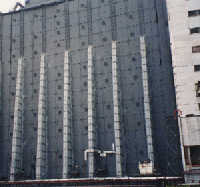 Close-up view of the Chornobyl Shelter |
The first technical function of the PMU will begin on May 4, when the first PMU Consultant team will arrive in Ukraine to start review of the early biddable project (EBP) proposals. Review and placement of the four EBP packages is expected to be completed during May and June.
Significant steps made on heat plant project
Recent work on the Chornobyl heat plant project has focused on legal, contractual and administrative activities required to move forward on completing the partially constructed fossil-fueled heat plant by October 1999. Once complete, the heat plant will be able to safely maintain Chornobyl plant systems when plant shutdown and deactivation activities begin.
The Chornobyl NPP International Project Management and Decommissioning Department assigned 15 staff members to serve on the Project Construction Management Group (PCMG). The group will work in four offices assigned to the PCMG, with specific job functions being identified.
The terms of reference needed to register the project have been provided to the National Agency for Reconstruction and Development (NARD). A joint order from NARD to the Ukraine Tax Administration has been negotiated and awaits final approval. This order establishes the requirements and procedures for tax exemption that Pacific Northwest National Laboratory (PNNL) and the PCMG will need to follow during the project.
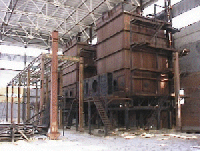 Hot water boilers for the Chornobyl heat plant. |
A standard tender package and example subcontract were prepared and will be used for the tender/bid process. A master schedule was prepared for all Phase 1 contracting activities. The key issues to be resolved are tax exemption and management of subcontractor milestone payments. PNNL is required to pay all subcontractors and material/equipment vendors to obtain tax exemption.
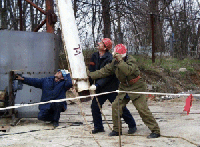 Workers at the vent stack mock-up training tower practice positioning a structural support in preparation for strengthening the actual vent stack. |
Repairs to the damaged ventilation stack between Chornobyl Units 3 and 4 began on April 23 . The external bracing that supports the stack was seriously damaged by the 1986 explosion at Unit 4, resulting in the possibility that the stack might collapse when heavily stressed by a small earthquake, high wind, or heavy snow loading. Collapse of this stack could significantly damage the operational Unit 3 or the Shelter, depending on which direction it fell.
The first two of nine structural elements with significant damage have been replaced. During the next two months, the remaining seven badly damaged elements will be replaced, and repairs will be performed to strengthen thirteen additional dented elements.
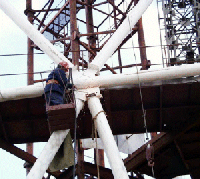 Welder uses a cutting torch on cross-members at the mock-up training tower. |
Vent stack repairs are funded by the U.S. Department of Energy ($1M), Canada ($800K), and Ukraine ($450K). Structural analysis, repair design, contracting, and project management are performed by Ukrainian organizations. Repairs are proceeding rapidly, and the project is on schedule for completion in July 1998. The work is expected to return the vent stack and its bracing to its full design strength.
Customs update
PNNL has indications of a decision by the customs authority of Ukraine to waive fees normally imposed for inspection, paperwork processing, and storage, and release from impoundment PNNL-supplied equipment destined for the Chornobyl Shelter. The equipment is valued at several million dollars. This is an important breakthrough, because much of the equipment needed for worker safety improvements at the Chornobyl Shelter has been held by Ukrainian customs since mid-1997. The process will be closely monitored to verify resolution and establish the schedule for actual release dates of the equipment.
Among the equipment are components for a neutron monitoring system designed and assembled at PNNL that will monitor and document the state of subcriticality of the nuclear fuel-containing masses located in the lower elevations of the Shelter. Dosimetry and other equipment for radiation safety, industrial safety, and radioactive dust suppression also are included.
Customs release of safety monitoring equipment looks promising
Equipment for the Chornobyl Shelter nuclear safety monitoring system has been in Ukraine since January, with 10 of the 16 crates still held by Ukrainian customs. Recent indications are that the customs problems may be resolved and that release of the equipment can be expected in the near term.
PNNL staff members will travel to Ukraine in June to train Chornobyl staff members on the use of the equipment . The training will be held in a laboratory of the Interdisciplinary Scientific and Technical Center that has facilities to reproduce the neutron and gamma radiation fields that the detectors will be monitoring.
Radios to aid in Chornobyl Shelter work
A shipment of 20 portable radios, eight mobile vehicle radios, and various accessories to be used by Chornobyl Shelter workers arrived in Ukraine on April 25. Much of the industrial safety equipment purchased in recent months to help protect Shelter workers remains in the customs warehouse in Slavutych awaiting approval for release.
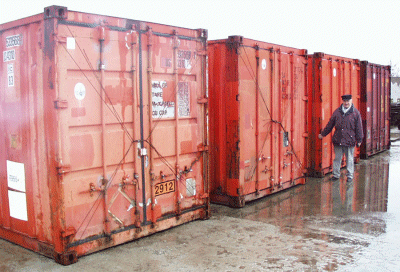 Containers of U.S. Equipment at the Chornobyl plant awaiting clearance from Ukrainian customs. |
See also Chornobyl Initiatives/General Information on Chornobyl and the Biweekly Report Archive.